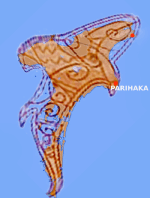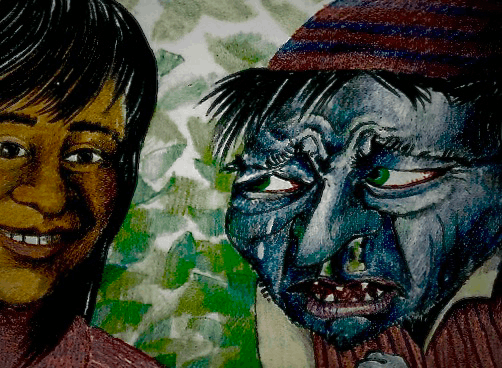| This was composed by
Te Tohu at Parihaka
when the Pakeha government was trying to steal Taranaki land for English settlers. Most tribes associated with that Rongo resistance movement have been performing only the highlighted words, but the ngeri's first verse has been revitalised in Taranaki tribal haka competitions recently and hopefully the full ngeri will become the standard format. |
|
| Maka atu ai Tohu te kupu
taimaha Ki runga1 ki te Pirimia, Ha, haha! Tū tonu, tū tonu! Ue noa, ue noa Mou tonu, mou tonu! Ue noa, ue noa! Tē taea te ueue! Tēnei to kai, ko taku tenetene Piri2 ki te hūhā. A ha ha Hapainga ake taku raparapa taki ture Nāku ko koe, nāku te motu, nāku te ao! E whiua, e tāia aue! Whakarongo mai te motu nei, Whakarongo te Iwi nei Ahakoa whakapiri koe ki a tauiwi E kore e taka tō ingoa Māori ki runga3 i a koe! He mangumangu taipō4 hoki tātou pakia! Te kupu a Tohu ki ngā iwi e rua! E kore e piri te uku ki te rino5 Ka whitingia e te rā ka ngāhoro. Ki, ki, ki, ki, ha! ō Tēnā ka ngāhoro! Ki, ki, ki, ki, ha! Tēnā kōpaia! Kā, kā, aue Hi! |
Tohu
is flinging the hard word up1 towards the Premier We will stay here permanently! Your pushing will be in vain We are attached here permanently! Your pushing will be in vain Nothing can shake us. Here is your food, (Swallow this, mate!) It is my resistance clinging to my thigh2 as armour! Always supported will be my search for justice. You belong to me, The land belongs to me, The world belongs to me to be shared and shaped. Take heed everyone on this island Take heed every tribe! Even if you associate with foreigners your Māori identity will not move south3 away from you! As black demons,4 you will still be denigrated. Here’s the word of Tohu to the two peoples: Clay will not stick to iron5. for as soon as it is shined on by the sun it will drop off. That’s right! Then it will fall off. That’s right! Thus we will be estranged. Burn, burn, alas, yes! |
 1.
Runga = up. 1.
Runga = up.Think of Kupe drawing a map of the North Island on the sand and seeing a breaching whale. Taranaki is the belly of Maui’s whale, while Wellington is its eye, and the centre of Pakeha power and influence.
1a
Pirimia = Premier.
Dick Seddon changed this title to ‘Prime Minister’ in 1900. 2. Piri was thickly-woven coconut fibre armour worn by Micronesians that resisted spear thrusts. But Tohu was comparing his people's permanent resistance to their tattoos. These acted as psychological and spiritual protection for warriors. 3. Runga - this has the meaning of "You will not stop being identified as a Maori" 4. Mangumangu Taipo = a black bogeyman. 
Te
Rangikaiwhiria Kemara explained on Twitter X.
Published on folksong.org.nz in November 2024
a) In olden days, there was pokokohua (boiled
head)- an insulting name to call someone, and
mangumangutaipo, which meant you should run in fear.
b)
A sea of black demons. A description for example, of the
hordes of Maniapoto. In haka across Aotearoa, this is
how it is often generally used.
c) Less known by those outside of my rohe, Mangumangutaipo was also a nickname for tohunga/masters of medicine for both healing and warfare, who lived up the back of my place. d) In post-colonial times it has been used in the literal translation, similar to nigger. By that I mean, its the way we described how many Pakeha treated and despised us back in the day. i.e "Ki a ratou he mangmangu taipo noaiho koe!" (To them, you're just another blackie/nigger). 4. E kore e piri It is well-known that clay will not adhere to iron unless it is wet. As soon as it is dry, it falls off. And so the composer appealed to the Māori of day that in spite of the trend to move more into European associations, they must at all times remember with pride that they are Māori and that no matter how much of the self-centered Western culture they adopt (referred to as ‘clay’), the time will come when it will fall from them and that eventually they will return to their communal Māori values. Excerpt from the Waikanae
submission
|
Mangumangu
taepo -
He haka nō Parihaka - Taranaki Iwi
whanui |
Visitors since November 29, 2024
freevisitorcounterss Homepage